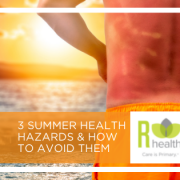3 Summer Health Hazards & How to Avoid Them
Summer is finally here and most of us are itching to get outside and enjoy summer activities since we spent the past year stuck inside due to the pandemic. Now that you’ll be spending more time outdoors, here are 3 of the most common summer health hazards that you should be aware of and tips on how to avoid them.
1. Heat Exhaustion and Heat Stroke
When temperatures reach sweltering, that’s when you have to worry about heat exhaustion and heatstroke. These heat-related illnesses can occur when you overexercise or are doing strenuous work in excessive heat and your body is unable to cool itself down. Our body’s natural way of cooling itself down is through sweating. If you are in the heat for an extend period of time, your body may have difficulty producing enough sweat to keep you cool which can lead to heat stroke. There are certain factors that can increase your risk for heat exhaustion and heat stroke such as your age.
So how do you know if you are experiencing heat exhaustion or a heat stroke? The easiest way to determine if you are becoming overheated is to stop and take a quick self-examination. Are you sweating heavily? Do you feel dizzy? Is your heart rate elevated? If you find yourself answering yes, to any of the above, you probably should find a cooler location, maybe indoors where the air conditioning is on, and drink water to help rehydrate yourself.
While heat exhaustion and heat stroke can come on suddenly, there are several ways you can avoid them.
- Take things slower than you normally would especially if you’re not accustomed to working or exercising in a hot environment.
- Wear lightweight, light-colored, and loose-fitting clothes and a hat to help you stay cooler
- Try to limit your outdoor activity to when it’s coolest, like morning and evening hours. Rest often in shady areas so that your body has a chance to recover.
- Stay hydrated by drinking two to four cups of water every hour that you are doing activities outside in the heat or direct sun and avoid alcohol or caffeine as these can dehydrate you.
2. Sunburns
While many people think a glowing complexion looks good, you are in fact hurting your overall health. The color your skin gets from being in the sun can speed up the effects of aging and can increase your risk of developing skin cancer. When you experience a sunburn, it’s actually an inflammatory reaction to UV radiation damage to the skin’s outermost layers and can range from mild to blistering.
The most important things to note about sunburns are that:
- Some people are more prone to sunburns, such as people with fair skin, run a higher risk of burning.
- Even if you are tan or your skin type is dark, the sun can still damage your skin and cause skin cancer.
- You should protect yourself every day of the year even though the sun’s intensity varies based on the season and time of day.
- Even if the forecast calls for overcast, you can still burn because up to 80% of UV rays can penetrate through the clouds.
- If your skin starts to peel after a sunburn, never try to peel the skin yourself and rather let it come off naturally. This is your body’s way of trying to rid itself of damaged cells.
To protect your skin and prevent sunburns:
- Avoid excessive exposure to the sun during the peak hours of sunlight which is typically between 10 am to 2 pm.
- Wear sunscreen and check the SPF. The SPF will tell you how long the sun’s UVB rays would take to harm your skin. So, for instance if you use an SPF 50, it would take you 50 times longer to burn than if you weren’t wearing sunscreen.
- Wear sun protective clothing such as long sleeves and hats.
While these are all great ways to avoid a sunburn, no single method of sun defense can protect you perfectly, so layer on these prevention methods.
3. Ticks
There are many different types of insects we encounter outdoors during the summer months, but ticks and tick bites usually generate the most questions and concerns. This is understandable since some ticks can transmit diseases, particularly Lyme disease. For this reason, it’s important to make a habit of checking yourself for ticks after spending time outdoors and remove them immediately so you can reduce your risk of contracting an illness.
Many people will get a local reaction from the tick bite that occurs immediately after, similar to other bug bites. It can be red, swollen and 1 to 2 inches in diameter, but shouldn’t continue to expand. Sometimes it will turn into something that looks like a “bullseye” or target, which is when you should start to be concerned and contact your doctor.
There are multiple things you can do to protect yourself, as best as possible, from ticks
- Avoid tick-infested areas like wooded and brushy areas with high grass and leaf litter. If you do find yourself hiking, walk in the center of trails.
- Dress appropriately if you plan to be in a wooded or grassy area by wearing pants tucked into your socks and long sleeves to help insects from biting or latching on to your skin.
- Use insect repellent with DEET, permethrin or picaridin.
- Keeping your grass short can reduce ticks in your yard as ticks are most often found in tall grasses and shrubs.
The key to having a safe and enjoyable summer is to watch out for these summer health hazards.





Leave a Reply
Want to join the discussion?Feel free to contribute!